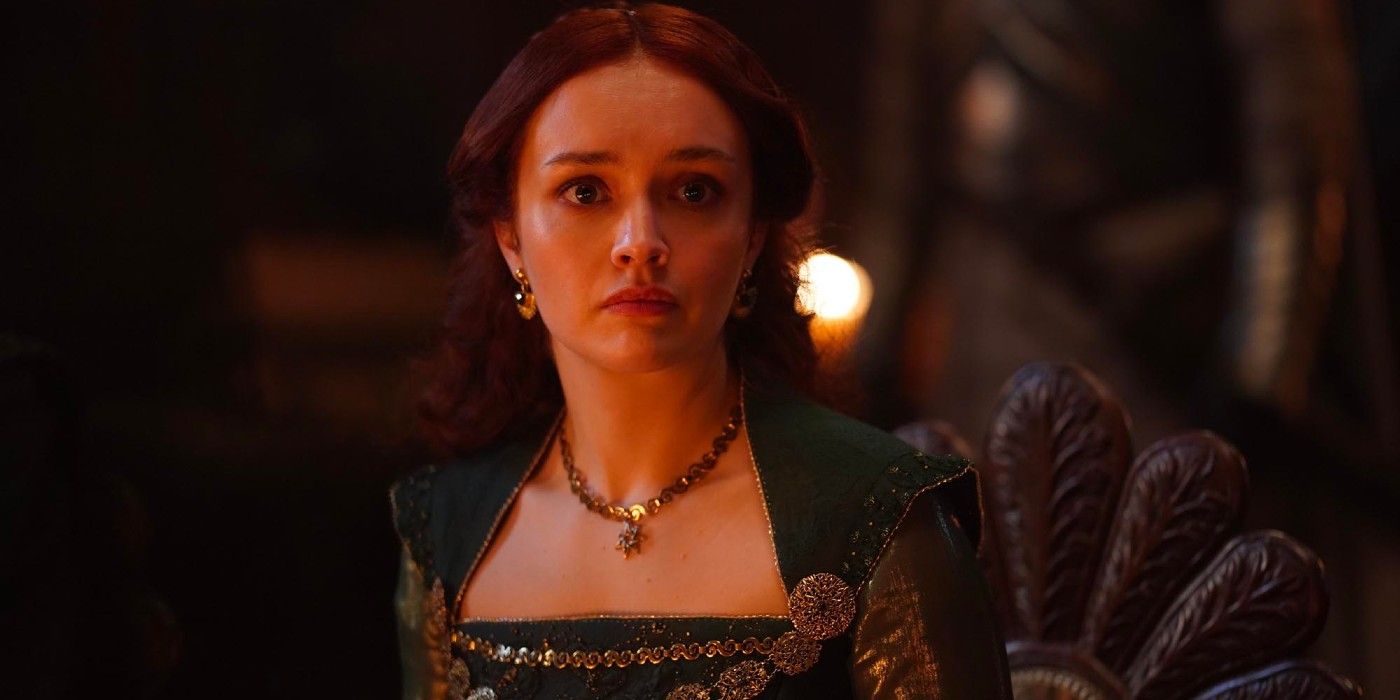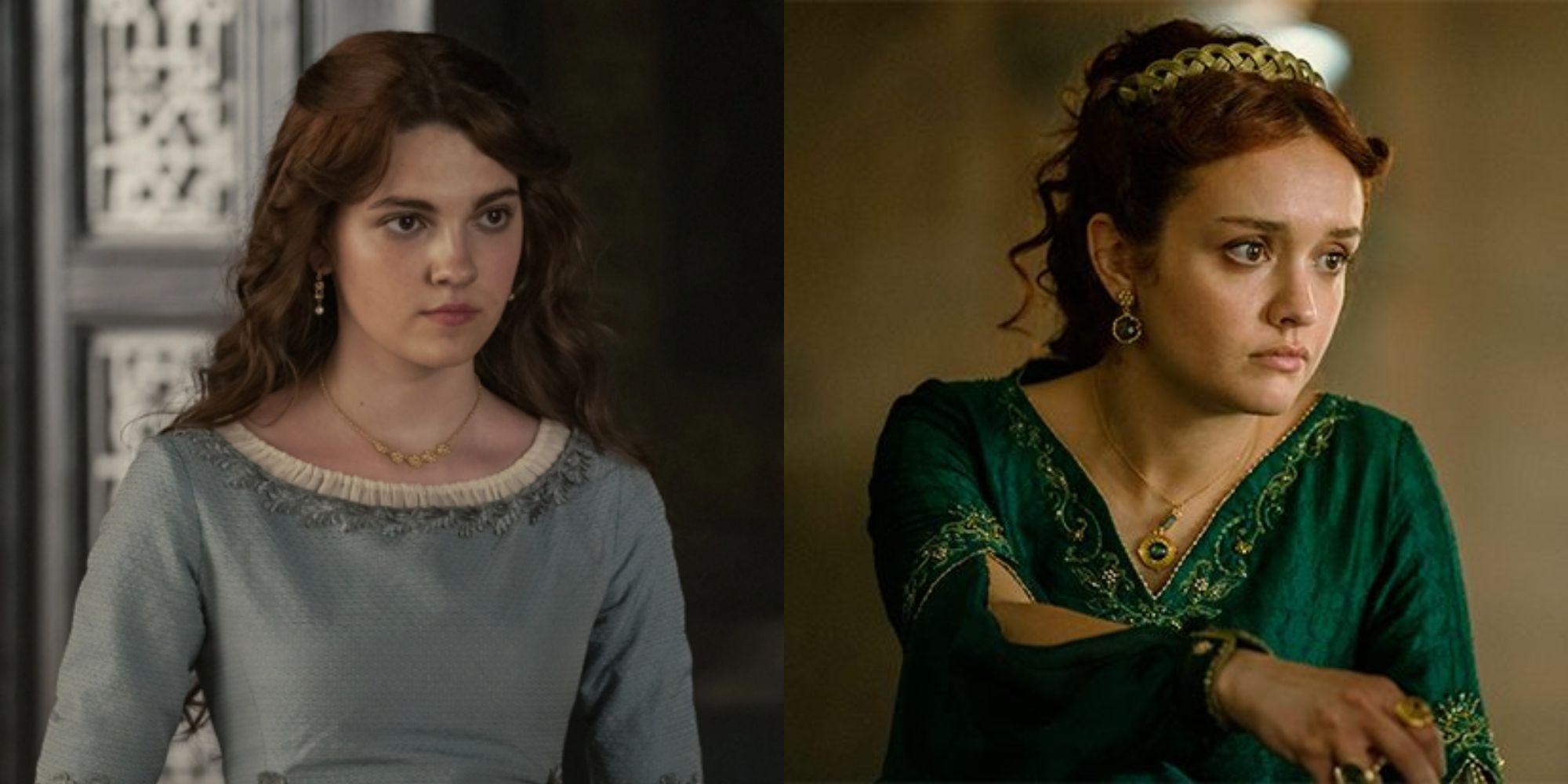WARNING! This article contains SPOILERS for House of the Dragon, episode 8 "The Lord of the Tides," and George R.R. Martin's book Fire and Blood! House of the Dragon’s episode 8 Alicent Hightower scene highlights her character shift greater than the show’s timejump recast. Queen Alicent Hightower (Olivia Cooke) is a product of her father’s political maneuvering and traditional Westerosi values, which manifests with an air of self-righteousness and conservative values. In House of the Dragon episode 5, “We Light the Way,” young Alicent (Emily Carey) condemns young Rhaenyra’s (Milly Alcock) “queer Targaryen customs” of marrying within the family as she believes Rhaenyra slept with her uncle, Matt Smith’s Daemon Targaryen, as well as admonishing her for lying to her face.
16 years later, in House of the Dragon episode 8 “The Lord of the Tides”, Queen Alicent Hightower forces the servant girl, Dyana (Maddie Evans), to drink Moon Tea after discovering that her son, Aegon (Tom Glynn-Carney) raped her in his chambers. While Alicent showcases some softness towards Dyana’s distress, she ultimately uses her power and influence to protect her son from a potential scandal and pays Dyana off. Queen Alicent Hightower lashes out at Aegon’s impropriety, going so far as to say “You are no son of mine,” however, in stark contrast to Alicent's earlier vilification of what she perceived as Rhaenyra's misdeeds, she outwardly tolerates Aegon's own crimes (justified as protecting her family) by silencing his victims.
Why Alicent Has Changed So Much In House Of The Dragon
While all the key players in the Dance of the Dragons receive considerable character development, Alicent Hightower experiences more severe changes than others. As a pawn for her father’s ambition, Alicent becomes the Queen consort by being at the right place at the most inappropriate of times. After the death of Queen Aemma (Sian Brooke), Alicent's father, Otto Hightower, commands to comfort King Viserys and strategically plants his daughter into the King’s proximity. As Queen consort, Alicent’s duty shifts to “squeezing out heirs” and being readily available for the King’s pleasure. Although her marriage to King Viserys isn’t devoid of affection, the King never truly loved her which further intensifies Alicent’s already existing resentment towards Rhaenyra’s position of entitlement.
From Alicent's perspective, she's living a life riddled with obligations put forth by a patriarchal Westeros while Rhaenyra manages to break every misogynistic rule in the realm and actually gets away with it. Added to the fact that Otto convinces her that her son, House of the Dragon's Prince Aegon Targaryen, is the rightful King of the Seven Kingdoms, it’s no wonder that Lady Alicent transformed into a bitter and petty Queen, capable of disastrous consequences all in the name of duty, honor, and decency. It is because of Alicent’s traumatic experiences while upholding her onuses stoically (which made her considerably miserable) that she develops into a sanctimonious hypocrite in House of the Dragon episode 8; one that marries off her children to each other and covers up sex crimes committed by her son.
You're Only Going To Dislike Alicent More As HOTD Continues
Despite House of the Dragon season 1 affording Alicent Hightower some space to be a sympathetic character, with her motivation to crown Aegon deeply rooted in safeguarding her kin, the show still promotes Princess Rhaenyra’s rightful claim as the appointed heir. With Alicent already establishing her tendency for hypocrisy early on, House of the Dragon sets her path to a more insufferable characterization as the story progresses. Queen Alicent Hightower’s blatant criticism of King Viserys constantly making excuses for his daughter, Rhaenyra, morphs into her own wrongdoing as she strives to maintain an image of her guiding principles: duty, honor, and decency.



